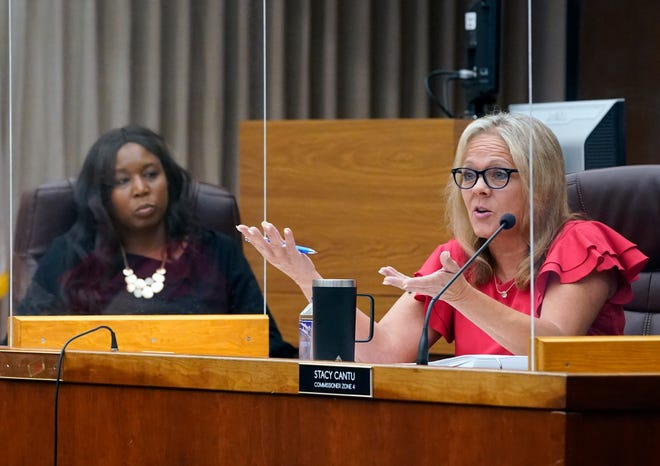DAYTONA BEACH — The city government has a financial dilemma that’s both enviable and a little risky.
If it stays within the limits of state law, Daytona Beach can indulge in $11.4 million that will help the city catch up on permits and licensing division projects. If it veers outside the parameters of a Florida statute, the city could be forced to forfeit the money, lose sales tax collections and be sued for failing to abide by state law.
The $11.4 million is the excess fund balance of building permit fees, and it has to be spent by Oct. 4.
City staff put together a list of more than a dozen things they say the money could be used for. But city commissioner questions have led to one item – a $1 million mobile command vehicle – getting deleted, and six other proposed expenditures coming into question.

The list was scrutinized during a three-hour City Commission workshop meeting Tuesday night, and now city staff will decide if any of their suggested expenditures need to be amended or removed.
At stake are projects that include $4 million to buy property for a new permits and license facility, and $1.5 million to renovate a new facility that can accommodate permits and licensing expansion.
Also on the list are a $125,000 rehabilitation of office space, a $250,000 renovation of a permits and license facility, the $600,000 construction of a meeting room for both permits and license officials and the city’s technical review team, and the $750,000 acquisition of a marine unit staging platform.
Also in question now are three new positions that collectively come with $400,000 in salaries and benefits annually: A fire inspector for new buildings; a building code enforcement staff liaison officer; and a flood plain management enforcement officer.
A March 25 letter from the city manager to state officials indicates the city was already trying to lock in a multimillion-dollar property buy for permits and licensing last year, but the seller pulled out. The document says “closing is now expected to occur on or before September 2024 with renovations beginning shortly thereafter.”
The letter goes on to say that “the acquisition will allow relocation and expansion of P&L operations.” It said the relocation would “accommodate the necessary increase in required staffing, the addition of a flood plain manager and assorted equipment and storage.”
The state government is watching
The city of Daytona Beach has been under state audit since 2021 because its permits and license fund level has climbed too high, and the city could be forced to forfeit some of those funds to the state government if they’re not used quickly enough.
State law says governments in Florida can’t let too much of their permits and license revenue go unspent year after year, but the city has found itself in that situation. The fund currently has a balance of about $19.7 million.
Top city staffers have come up with the $11 million plan to draw down the revenue, and those suggested expenditures are what’s being reviewed for compliance with state law.
Until the beginning of May, at least some city commissioners had been unaware of the accumulated permits and licensing funds, the state laws governing their use, and the ongoing audit.

In a May 8 email sent to several top city employees, City Manager Deric Feacher wrote that the mobile command vehicle could “be beneficial” for both permits and licensing and city operations dealing with “Code, Building, Fire Inspectors and during major disasters/events for Police and Fire.”
But state law indicates permits and licensing fund dollars have to be used for permits and licensing functions. Commissioners decided Tuesday to drop the mobile command unit purchase.
The state auditor general and Joint Legislative Auditing Committee have been involved in an effort to bring the Daytona permits and license fund into compliance. An audit report for the 2021-22 fiscal year concluded that the city’s unexpended building permit funds at the end of the budget year exceeded the city’s average operating budget for the previous four fiscal years by $10.97 million.
In early December last year, the 11-member Joint Legislative Auditing Committee made up of state senators and state representatives directed the city of Daytona Beach to provide a written update explaining the status of its corrective actions.
On March 25, Feacher sent a letter to the committee’s chairman and vice chairman detailing the city’s updated plan to reduce the amount of unexpended fund balance. That plan is what commissioners took a hard look at Tuesday.
Feacher’s letter said the growth in Daytona Beach has created a need to expand the city’s permits and licensing staff, acquire additional workspace and buy new equipment.
What the law says
A state law passed in 2019 says permits and licensing funds have to be spent within four years of being collected.
The law requires the auditor general to notify the Joint Legislative Auditing Committee when a municipality has failed to correct an audit finding that has been reported in three successive financial or operational audit reports.

City Commissioner Stacy Cantu told Feacher that problems with the permits and license fund could have been resolved a few years ago if he had gotten city commissioners involved.
“Why haven’t we had a workshop asking us, ‘do you approve of this?’ ” Cantu said at Tuesday’s meeting. “We probably could have solved this audit a long time ago if you had come to us and asked us what we want.”
In a May 30 memo to Feacher, City Attorney Ben Gross explained that building permit fees are generally limited to enforcement of the Florida Building Code.
State law says enforcing the Florida Building Codeincludes building plan reviews, building inspections, re-inspections, and building permit processing. It can also include building code enforcement, fire inspections for new construction, and training costs.
An excess fund balance can only be used for rebating or reducing building permit fees, and paying for the construction of a building that houses a local government’s building code enforcement agency or the training programs for building officials, inspectors, or plans examiners associated with the enforcement. Any portion of the excess fund balance used for building construction cannot be carried forward for more than four consecutive years.
Building permit fees can not be used for planning and zoning; general government activities; inspections of public buildings for a reduced fee or no fee; enforcement and implementation of any other local ordinance; and public information requests, community functions, boards, and any program not directly related to enforcement of the Florida Building Code.
Some of the staff-suggested expenditures commissioners questioned Tuesday included a $250,000 upgrade of the City Commission chambers that are used by permits and licensing staff, but also by city commissioners and several city boards.
‘Go with the literal language of the law’
While permits and licensing funds are under a microscope now, Feacher said “the city has not misused any permits and licensing funds.”
He also noted that prior to the passing of the 2019 law, there was no limit on how much cities could carry forward in permits and licensing funds, so revenue built up. Gross noted that cities sometimes let that money accumulate to compensate for downturns in the economy when building activity slows down.
Feacher also said the city has been submitting spending plans for the funds to state officials for two years.
Read more:An $11 million dilemma: City of Daytona has to quickly spend millions or lose the money
City commissioners talked about waiving permit fees temporarily to draw down funds, but they didn’t take a vote on that since they couldn’t during a workshop meeting.
Gross didn’t get into specifics of what the city should and should not do with permits and licensing funds, but he did suggest that the city “follow the strict language” of state law.
“My recommendation is to go with the literal language of the law,” Gross said.
You can reach Eileen at [email protected]












